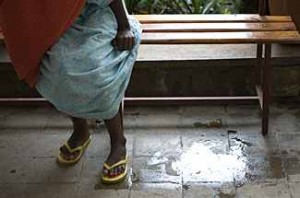Experts and development partners have called for prompt actions to end Obstetrics Fistula through provision of quality maternal health care and accountability mechanisms. According to the World Health Organisation (WHO), about two million young women live with untreated Obstetric Fistula in Asia and sub-Saharan Africa.
Obstetric Fistula is a medical condition in which a fistula (hole) develops either between the rectum and vagina or between the bladder and vagina after severe or failed childbirth, when adequate medical care is not available. It is considered a disease of poverty because of its tendency to occur in women in poor countries who do not have health resources comparable to developed nations.
This condition harms women physically, socially and economically, and often leads to isolation from families and communities, thereby deepening their poverty and worsening their sufferings.
Predisposing Factors
Gynaecologist and Technical Adviser at Development Communications (DevComs) Network, Dr. Olalekan Olaniyan, says early marriage, illiteracy, ignorance and poverty predisposes women to obstetrics fistula. According to him, poor health-seeking behaviour, delays in using health facility, delays in reaching health facility, poor health infrastructure (for caesarean delivery when needed) make the risk of Obstetric Fistula even greater.
Executive Director, United Nations Population Fund (UNFPA), Dr. Babatunde Oshotimehin, in a release on International Women’s Day marked recently, said that about 20,000 girls below age 18 give birth in developing countries daily and nine in 10 of these births occur within marriage or union.
Nigeria is one of such countries where child marriage and harmful traditional practices are common, while percentage of birth delivered in a health facility is 35.8 percent, according to Nigeria Demographic and Health Survey (NDHS) preliminary report, 2013. Consequently, over 64 percent of births take place at home and other places, due to several factors such as inability to afford health services, distance to health facility, concern that there may not be a female provider, and attitude of health workers.
Prevention
According to the World Health Organisation (WHO), Obstetric Fistula is preventable and can be avoided by delaying the age of first pregnancy, ending harmful traditional practices and timely access to obstetric care.
Olaniyan calls on government to improve health systems and social infrastructure, in order to provide prompt caesarean session for women going through prolonged and obstructed labour. He also advocates for alleviation of poverty, illiteracy and end of harmful traditional practices.
Benefits
Preventing and managing Obstetric Fistula contribute to the Millennium Development Goal 5 of improving maternal health, says the WHO. The United Nations Population Fund (UNFPA) recommends universal access to reproductive health services, including maternal health care and fistula treatment. It adds: “We must eliminate gender-based social and economic inequities, discourage early childbearing, promote education and human rights, and foster community participation.”
United Nations Secretary-General, Ban Ki-moon, in a statement to observe the International Day to End Obstetric Fistula, says it is important to raise awareness of the condition because it is not well-understood even in societies where it is prevalent. “The more understanding and action we generate today, the more we can look forward to a future where obstetric fistula is virtually unknown,” he said.
DevComs Network’s Media Officer, Ayodele Adesanmi, observers that the condition is synonymous to ending prolonged labours, which is the duty of all stakeholders, including government, health workers, community members and the media. “The role of the media in reducing stigmatisation and violation of the rights of women leaving with fistula cannot be over-emphasised,” he contends.
Call to Action
Ending Obstetric Fistula is the responsibility of all stakeholders, however, the government must play a leading role and show will and commitment to improve the quality of maternal health services rendered in the country through increased budgetary allocations and provision of infrastructures. “Obstetric Fistula still exists because health care systems fail to provide accessible, quality maternal health care, including family planning, skilled care at birth, basic and comprehensive emergency obstetric care, and affordable treatment of fistula,” says the WHO.

